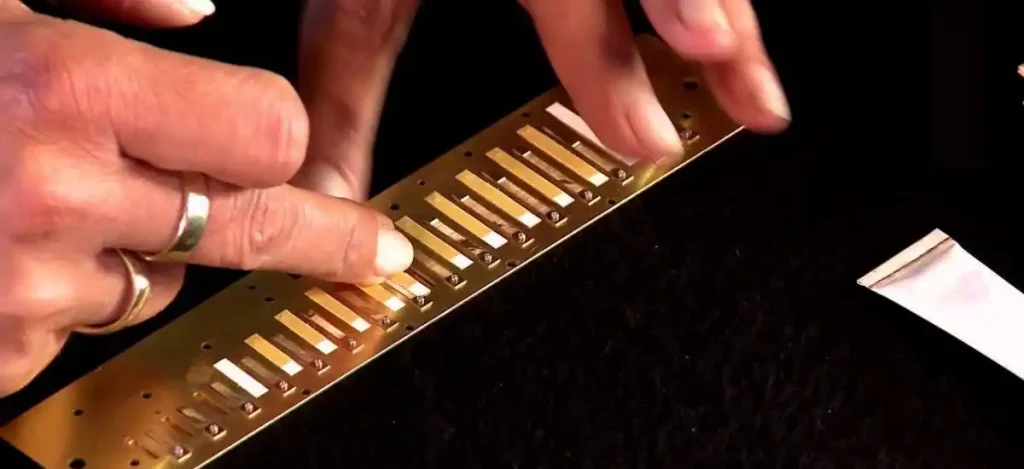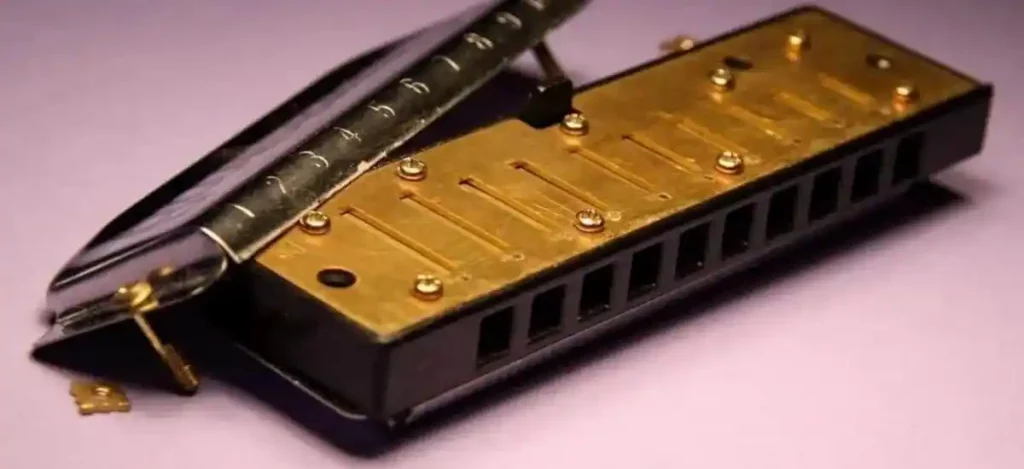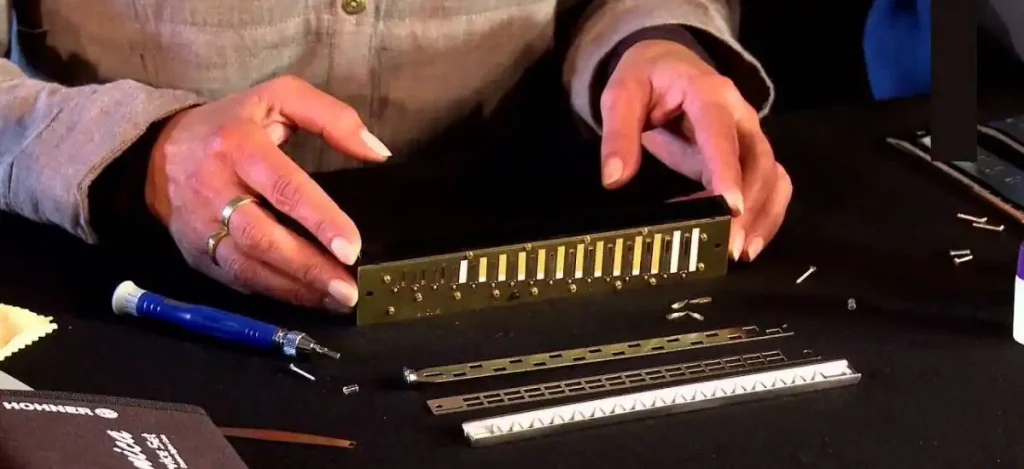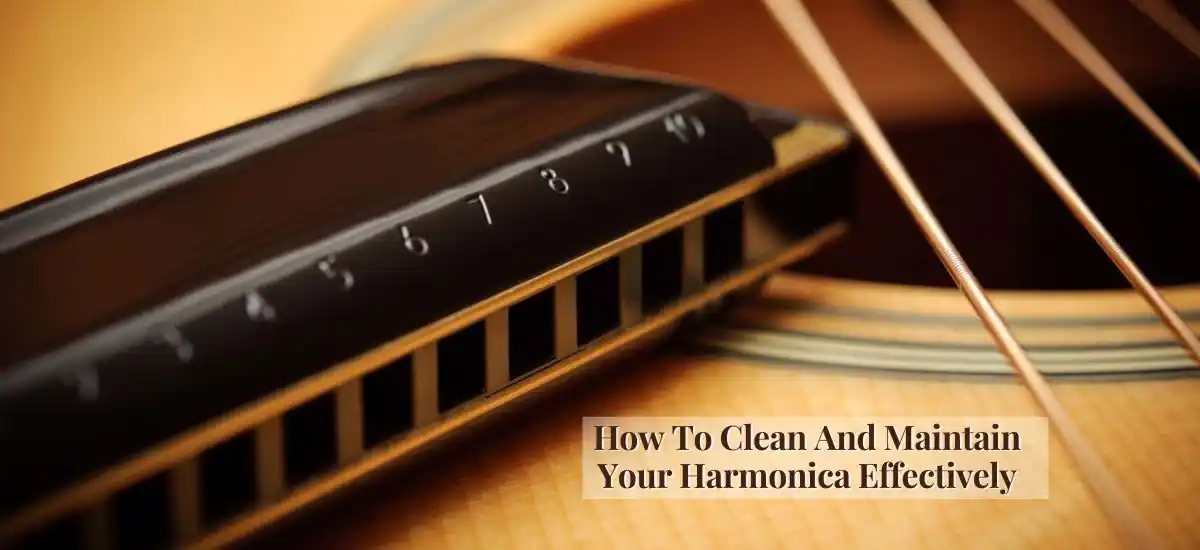Musical instruments generally continue to function even if they aren’t cleaned regularly. However, the harmonica is different. If dust accumulates or the instrument isn’t properly maintained, it can stop playing. Regular cleaning is essential because the harmonica easily gathers dust, dirt, and remnants of anything that might be in your mouth. Here are a few simple steps to clean your harmonica effectively..

Simple Steps To Clean Harmonica:
Steps to Clean Your Harmonica
1. Disassemble the Harmonica
- Carefully take apart the harmonica: Most harmonicas are made up of a cover plate, reed plates, and a comb. Use a small screwdriver to remove the screws and gently take apart these components.
- Take note of the parts: Ensure you remember how to reassemble them. Taking a photo before disassembling can be helpful.
2. Clean the Cover Plates
- Wash with warm water and mild soap: Use a soft cloth or a toothbrush to scrub away any dirt or residue.
- Rinse thoroughly: Ensure all soap is removed to avoid any taste or residue when you play.
- Dry completely: Use a soft towel to dry the cover plates thoroughly, or let them air dry.
3. Clean the Reed Plates
- Brush gently with a toothbrush: Use warm water and a mild soap solution. Be gentle to avoid damaging the delicate reeds.
- Rinse well: Make sure all soap is removed.
- Dry carefully: Pat dry with a soft towel or allow to air dry completely. Make sure no moisture is left, as it can cause rusting.
4. Clean the Comb
- Use a soft brush: Depending on the material (plastic, wood, or metal), gently scrub with a toothbrush or a soft cloth.
- Rinse and dry: Ensure it is thoroughly dried before reassembling.
5. Reassemble the Harmonica
- Put all parts back together: Follow the reverse order of disassembly.
- Ensure everything fits snugly: Make sure all screws are tightened properly but not overly tight to avoid damaging the parts.

Read more to know about Is Piano a String Instrument?
Reassembling Your Harmonica
When placing the slide correctly, it should fit on top of the comb. Reinstall the mouthpiece, ensuring the screws are facing down. Orient the comb so that the spring fits on the right side.
You can use this method to clean diatonic, tremolo, and octave harmonicas. The same process applies to chromatic harmonicas, but extra caution is required. It’s recommended to consult a chromatic harmonica expert before dismantling your instrument.
Pro Tip for Cleaning Your Harmonica
Heavy particles on the reed plates and surface can negatively affect the instrument’s tone. Food, hair, skin, and pocket debris can accumulate between the reed and reed slot, disrupting the reed’s action. Saliva buildup is also common, so rinsing with warm water regularly is the best way to maintain your harmonica.
Cleaning Steps
Step 1: Rinse with Lukewarm Water
- Rinse your harmonica with lukewarm water.
- Tap it against your hand to remove any remaining water.
Step 2: Allow to Dry Thoroughly
- Let your harmonica dry completely.
- If your harmonica has a wooden comb, use a soft, dry brush to clean it instead of water to avoid swelling and cracking the wood.
Preventative Tips
- Before Playing: Always wash your mouth and avoid playing after eating food or snacks. Brush your teeth before playing.
- Drink Only Water: Avoid drinking anything other than water before playing. Sugar and other particles in drinks can enter your harmonica and cause damage.

Regular Maintenance Tips
- Tap out moisture: After each use, gently tap your harmonica against your palm to remove any moisture.
- Avoid eating before playing: This helps to keep food particles out of your harmonica.
- Store in a clean, dry place: Use a harmonica case to protect it from dust and dirt when not in use.
Conclusion
Keeping your harmonica clean is crucial for maintaining its playability and sound quality. By following these simple steps regularly, you can ensure your harmonica stays in great condition and continues to produce beautiful music.
Frequently Asked Questions
Q1. How often should I clean my harmonica?
A1. It’s best to clean your harmonica after every few uses, especially if you play it frequently. A deep clean every few months is also recommended.
Q2. Can I use any cleaning agents for my harmonica?
A2. It’s best to use mild soap and warm water. Avoid harsh chemicals as they can damage the harmonica.
Q3. What if my harmonica is made of wood?
A3. Be extra gentle with wooden harmonicas. Use minimal water and dry them thoroughly to prevent warping.
Q4. Is it okay to soak my harmonica in water?
A4. Soaking is generally not recommended, especially for wooden or delicate parts. Spot cleaning is usually sufficient.
Q5. How can I prevent my harmonica from getting dirty?
A5. Avoid eating before playing, tap out moisture after use, and store it in a clean, dry case.
By maintaining your harmonica regularly, you ensure it stays clean and functions well, allowing you to enjoy its music for a long time.

